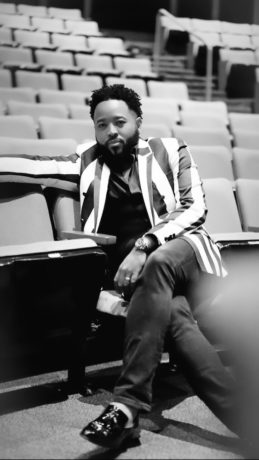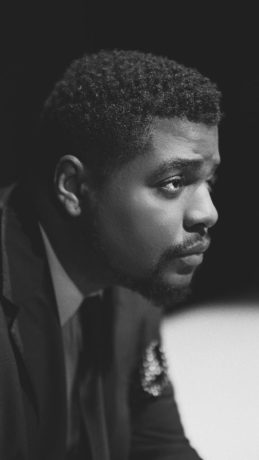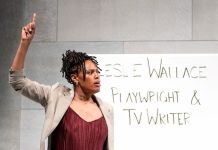The authors of the following two op-eds are cofounders of DC’s acclaimed Restoration Stage, Inc., whose focus is “restoring the Black family—one story at a time.” Collaborating as director (Courtney Baker-Oliver) and playwright (Steven A. Butler, Jr.), they have created an outstanding body of original work that includes Veils, Chocolate Covered Ants, and The Very Last Days of the First Colored Circus. Their full bios are below.
“A Seat at the Table”
By Courtney Baker-Oliver, Founding Artistic Director, Restoration Stage, Inc.
The story of Restoration Stage is inherently miraculous in that its creation was completely unintentional. The Company was born in the spring of 2005 when I read Steven A. Butler, Jr.’s revolutionary play The Truth and set about putting it on stage. At the time, I had been a producer and theater teacher at Duke Ellington School of the Arts for nearly a decade and was intimately acquainted with the storied tale of how Mike Malone and Peggy Cooper Cafritz had audaciously forged ahead with creating their vision for a transformational arts institution while still unbelievably young themselves. When Steven and I got started, we weren’t yet thirty years old.
Audacity has been a hallmark of our work. It simply didn’t occur to us to ask for permission to tell what we knew were compelling stories of Black life. We didn’t ask for the established artistic institutions we were peripherally affiliated with to greenlight our movement (I’d been the Education Director at theatreWashington, producers of the Helen Hayes Awards, when I was twenty-five). We just did it.
Most Black people who work in theater are used to being the other in the room. That wasn’t my experience. What I know about making plays I learned at the feet of Mike Malone and Kenneth Daugherty and Charles Augins and Lynda Gravatt and Dr. Carole W. Singleton and Kenneth Johnson. At Howard University, where I arrived at seventeen, I was guided by Henri Edmonds, Kelsey Collie, Reggie Ray, and Al Freeman, Jr. I spent my twenties welcoming theater luminaries including Viola Davis, Richard Wesley, David E. Talbert, and Petronia Paley into my classroom to speak. Maya Angelou, Dave Chappelle, Isaiah Washington, Malik Yoba, and Jason George all visited and they all said the same thing: the work is hard, people will pretend not to see you, but you owe it to yourself and your people to forge ahead. I listened.

Restoration Stage’s first staged reading occurred on May 31, 2005. With zero publicity other than word of mouth and a stack of four-by-six postcards, it was so well attended that we were forced to turn people away. But I wasn’t surprised that we had an audience. I knew that in a city where more than one hundred theaters were producing shows and more than half of the population was Black, only Jennifer Nelson’s African Continuum Theatre Company was focused on presenting work that reflected the depth and breadth of the fullness of the lives of Black people. I’d been to countless shows in theaters large and small where miniscule audiences watched my white counterparts do their sometimes good, sometimes not so good work. They were given chances to fail that no Black newcomer would be and that didn’t mean I could give up. I knew that what August Wilson famously espoused was true: “Black theater is alive. It just isn’t funded.” So, I forged ahead.
While driving through my Bowie, Maryland, neighborhood a few years later I stopped at the imposing Bowie Center for the Performing Arts to inquire about the kind of work they were producing there. That stop led to presenting another of Steven’s plays there, the well-received Chocolate Covered Ants. What I remember most about the experience of working out of that pristine space was the pervasive attitude that we didn’t belong there. One of the senior members of our staff was actually told to her face that “you guys really seem to know a lot about theater,” as if we hadn’t all earned theater degrees.
When I asked the Technical Director about a large wooden sign in the scene shop emblazoned with the words “Burger Palace” on it, I was excoriated for not knowing what show it referenced. “How can you be a theater person and not know that that’s from Grease?” I was interrogated. He was incredulous when I told him that I didn’t care about Grease. “There are no Black people in Grease,” I told him. He hit back with “Sometimes theater is just for fun” as a retort. I respectfully tried to explain that for as long as Black people so infrequently had the platform to tell stories, I believed that when we did, we had an obligation to say something, to move the ball of cultural understanding further down the field, to do more than “have fun.” That’s what being Black in theater is like.
Over the years I’ve learned that you can work to save the thousands of dollars necessary to produce your show, bite your tongue in the face of every micro-aggression leveled at you by the white theater owner, bring them patrons and press, and still be reviled for being Black and excellent.
Supposed allies will tell you to your face that they’ve never read August Wilson or that his work is outmoded. It is impossible (for me) to pretend anymore to have serious conversations with theater makers who have no desire to know Black playwrights like Richard Wesley, Pearl Cleage, Douglas Turner Ward, and Ed Bullins, who imbue Black life with the dignity it has always inherently possessed. And while I’m happy to see the new wave of Black theatrical provocateurs like Michael R. Jackson, Jr. and Jeremy O. Harris appear on the scene, I don’t think anyone can seriously argue that their work does anything to dignify the journey of Black people. And I question the motive in why these “post-racial” writers are who the white theater establishment seeks to support.
So, while I’ll keep inviting Peter Marks to see what we’re cooking up at Restoration Stage, I’m not holding my breath for him to make his entrance. He can’t validate me. The truth is, the accolades of the white theater establishment have never been what our work is all about. The “Helen Hayes recommendations” of our shows are nice, but they aren’t what motivate me and my team. I transparently speak about the imperative that we tell our own stories through our own lens. As we continue, it’s a relief that folks like Kay Kendall, Sandra Evers-Manly, and Joyce Garrett believe that our work is important and should be supported financially, but telling Black stories onstage so that Black life is memorialized, reflected upon, celebrated, and seen is what guides me.
I’m an arts educator. Specifically, I’m a theater teacher. Like Kenneth Daugherty and Glenda Dickerson before me, I will continue to educate my students about Alice Childress, Owen Dodson, Randolph Edmonds, and others while simultaneously teaching Tennessee Williams, Edward Albee, Arthur Miller, and Moliere. I will continue to insist that they are prepared to discuss the masterworks of the playwrights that are lauded as pillars of the theatrical cannon. But, I will keep giving the accusatory side eye to those who dismiss the contributions of emerging Black writers, directors, and scholars while mounting a Black musical once a year to fill coffers or feel “woke.”
Your refusal to open the door to me and the hundreds of others like me is excruciating and exhausting, yes. But I stand on the shoulders of people who persevered, persisted, and left for me a rich legacy of theatrical greatness that is undiminished by your refusal to acknowledge it. A seat at your table is something I’ve long since ceased to demand. I will continue to consistently serve up unapologetic Blackness on the table my ancestors have prepared.
“The Unarmed Warrior”
By Steven A. Butler, Jr. Playwright, Restoration Stage, Inc.
The current climate of cancel culture has made us all feel comfortable enough to call out those who have abused their theatrical powers over the years and demand to replace them with those who are more open and willing to tackle the numerous atrocities that their predecessors left behind. But will they? How do we know that the person who will be tapped to pick up the baton that Paul Meshejian, the founding artistic director of Play Penn, let sloppily slip from his hands will be any better? I’m sure whoever the next person to take the title is will be more than aware of the mistakes that were caused by Meshejian, but will they be adequately equipped to join the battle against the internal corruption and injustices that they will surely face? Or are we just replacing one unarmed warrior with another?

A few years ago, I had the opportunity to be a part of a prestigious playwriting cohort at one of the biggest regional theaters in the country. It was a big milestone in my career; at least I thought it was. I admit that as the first Black man to be selected to sit at the table, I probably was on the defensive most of the time and caving to internal and societal pressures to be great and to represent all of the Black playwrights who deserved to be there over me.
Once a month for approximately two years, I, along with six other playwrights, completed our writing assignments and shared them with each other. I was excited to be at the table—even joyful in the knowledge that I would finally be able to share my struggles as a writer with my fellow brothers and sisters of the pen. But, as we started to share and critique each other’s work, I discovered that many of the other playwrights didn’t appreciate or know any of the iconic Black playwrights, actors, or theatrical moments in Black theater history that I brought up in our conversations. As a Black playwright/actor, I was expected to know the works of Ibsen, Simon, and Williams. But when I brought up the names and works of Black playwrights like Baldwin, Hughes, and Wesley, most of the room went silent.
So, my question is: how are we as theater people supposed to fix the racial inequalities in our industry if our training facilities aren’t teaching the works of Black writers and their characters? As a proud graduate of Howard University, I was forced to learn the works of many white playwrights. I spent a whole year studying Shakespeare’s outdated, racist, and misogynistic body of work. But who’s teaching the white theater students August Wilson? Do they have to spend their senior year performing the works of Hurston? Have they even heard of Hurston? White theater students graduate and become part of the industry taking on positions of power and influence without any knowledge or appreciation of our stories and voices. It’s this lack of knowledge and appreciation of non-white artists and their work that has us in the mess we’re in now.
Can a white theater director really lead a cast of Black actors if their training is vastly different? Do they even understand how much work a Black actress has to do to create a complicated and layered Beneatha or understand why she didn’t retaliate when her mother rightfully slapped her? Do they know that you can’t cut Mrs. Johnson’s scene without cutting out the heart of the story? Do they even know what play I’m referencing?
Black actors and playwrights need their directors, stage managers, and producers to be allies not critics. Often we are told to by white theatrical leaders to “urban it up” or make it more Black (and yes, it’s offensive). But, are they only expressing these offensive remarks because they don’t have the love language that only a Black director can communicate with their cast? A Black director can instruct their actors to call upon their ancestors when they are directing them. They never have to say, “Blacken it up,” or “Do it like Oprah did it in The Color Purple.” Instead, they say, “How would your grandmother walk into a room? How would she feel after working in the sun all day only to come home and work for her family?”
Yes, some stories are universal. All the great ones are. But if you want a true African-American experience in theater—where your talent can feel free and safe enough to create, then it is just as important that your creative and production team be Black as well (or at the minimum be well-equipped allies.) If we have to study Ibsen, then you should have to study Wilson, because in this battle against racism and injustice the unarmed warrior is always the first to die.

Courtney Baker-Oliver (Director/Producer), is a graduate of Howard University, where he earned his B.F.A. in Theater. He also completed coursework at La Sorbonne and the American University of Paris in France. As a producer, director, writer, and teacher, Courtney has spent twenty years training young artists. From his role on faculty at Duke Ellington School of the Arts to his work as Education Director of the theatreWashington (Helen Hayes Awards) and beyond, he’s been developing the skills set required to direct productions on the world’s stage. Always pushing for positive images of Blacks in the arts, Courtney has developed tributes presented before legendary leaders Maya Angelou, Cicely Tyson, and Congressman John Lewis, among others. Courtney directed the debut tributes for the U.S. Postal Service’s African-American stamps honoring Paul Robeson and Marian Anderson, and in 2013 he organized the entertainment for the King Family’s commemoration of the March on Washington at the MLK Memorial. He was a master teacher at Britney Spears’s Summer Arts Camp on Cape Cod and has worked with Diana Ross, Ruby Dee and Ossie Davis, Taraji P. Henson, Justin Bieber, and many more. He has directed or taught notables including Cornelius Smith, Jr. (Scandal), Samira Wiley (The Handmaid’s Tale), Corey Hawkins (24), Isaiah Johnson (David Makes Man), and numerous others.
Steven A. Butler, Jr. (Playwright/Screenwriter) hails from Fort Washington, Maryland, a suburb of Washington, DC. He graduated from Howard University with a B.F.A. in Acting after a four-year tour of service in the United States Air Force. Steven is a veteran performer, appearing in Dianne McIntyre and Olu Dara’s Open the Door, Virginia!, the story of one Virginia county’s struggle with integration following the Brown v. Board of Education decision. Some of his other credits include The Old Settler (Husband), Fences (Corey), and the PBS documentary Slavery and the Making of America. Steven is an Arena Stage Playwright’s Arena Playwriting Fellow whose plays have been viewed and taught around the world. He enjoyed a close relationship with his artistic mentor, the legendary stage, television, and film actor Al Freeman, Jr. His plays include The Truth, Chocolate Covered Ants, All That Glitters, Veils, The Katrina Project, Drag On! The Very Last Days of the First Colored Circus, and Silver Foxxes, as well as his new play, Live from the Whitelaw Hotel, currently in development. His first screenplay (adapted from his play The Very Last Days of the First Colored Circus) was completed earlier last year. He is the Playwright-in-Residence at Restoration Stage, Inc.




